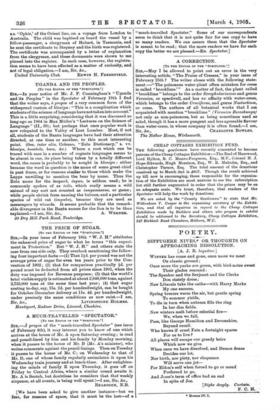UGANDA AND ITS PEOPLES.
[TO VIE EDITOR OF THE "SPECTATOR.")
SIR,—In your notice of Mr. J. F. Cunningham's "Uganda and its Peoples" in the Spectator of February 18th I find that the writer says, apropos of a very common form of the widespread custom of hlonipa : "This is a complication which students of the science of language have not taken into account." This is a little surprising, considering that it was discussed so long ago as 1864 in Max Miiller's "Lectures on the Science of Language" (II., 39); but perhaps that once popular work is now relegated to the Valley of Lost Lumber. Most, if not all, students of the Bantu languages have had their attention directed, at one time or another, to this most interesting point. (See, inter alio, Colenso, "Zulu Dictionary," s. vv. hlonipa, bambelo, basa, &c.) Where a root which can be traced with ease in a number of cognate languages seems to be absent in one, its place being taken by a totally different word, the cause is probably to be sought in hlonipa : either because the word in question is the name of some great chief in past times, or for reasons similar to those which make the Lapps unwilling to mention the bear by name. Thus the Zulu name for the leopard, ingwe, is seldom used ; he is commonly spoken of as isi/o, which really means a wild animal of any sort not counted as innyamazane, or game ; while people shrink from naming the baboon, and a particular species of wild cat (impaka), because they are used as messengers by wizards. It seems probable that the remark- able divergence in the Bantu names for the lion is to be thus explained.—I am, Sir, &c., A. WERNER. 20 Dry Hill Park Road, Tanbridge.










































 Previous page
Previous page